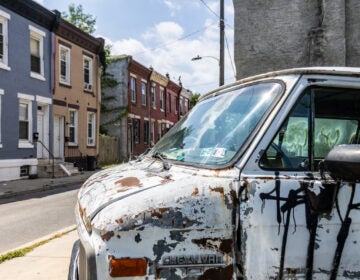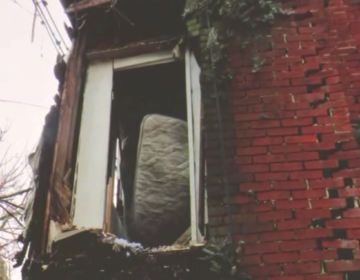Bryant Riley’s dream Philly home turned into a nightmare. He blames City Hall
An aggrieved Brewerytown homebuyer says lax oversight by the Philadelphia Department of Licenses & Inspection enables developer misconduct.

Bryant Riley in his Philadelphia home, October 2019. (Courtesy of Bryant Riley)
Two weeks after Bryant Riley closed on his new home in Brewerytown last year, he returned from work one day to find that his lights and gas had been turned off.
He was stunned to learn that, according to PECO, he had an illegal electrical connection and lacked a properly registered electric meter.
Riley, a recent transplant from Chicago who works as a real estate analyst, had been very happy with his first home, with its exposed brick walls and hardwood floors, on a quiet tree-lined street a few blocks southwest of Ridge Avenue. But the snafu raised a red flag, especially when the developer who had sold him the house denied he’d done anything wrong and said Riley must have caused the problem.
As months passed, he noticed more flaws in his house. The air conditioning wasn’t working in half of the building. Rainwater started coming in through a skylight. He found a leak from the kitchen into the basement, and another from the second-floor bathroom into the kitchen.
Kevin Mathisen, the developer who built and sold him the house, said he’d come out and make repairs. But as of this week, more than a year after Riley bought the house, Mathisen hasn’t fixed anything.
“The developer says he’s going to do it, but he’s just been dragging his a**,” Riley said.
In an interview, Mathisen acknowledged the problems Riley described. At first he intended to patch the roof, he said, and he planned to schedule air conditioning repairs this past spring — about seven months after Riley discovered the system wasn’t working properly.
But he said he changed his mind when Riley called the police on one of Mathisen’s subcontractors. While working on a neighboring house, the contractor repeatedly plugged into one of Riley’s outlets without permission, essentially stealing electricity from him, Riley alleges.
Riley also later emailed Mayor Jim Kenney, Council President Darrell Clarke, the city’s Department of Licenses and Inspections, and other city officials and agencies. The former Venture for America fellow put up a series of Twitter posts describing the problems in his house and Mathisen’s response. That displeased the developer, who says he has renovated more than 200 homes in Philadelphia.
Since moving into my brand new home, I’ve had three different plumbing leaks, a faulty HVAC system that stopped working this summer, a leaking roof, and improper ventilation issues with the bathrooms. {THREAD} pic.twitter.com/qyA6585EWt
— Bryant Riley (@BryantRiley_) June 10, 2020
“It escalated much too quickly, from where I was standing,” said Mathisen. “There were some false accusations from his end, to me, and slander. I started the process of having these repairs made, but once that began … I’m a 40-year-old man with a wife and children, and I’m not going to be disrespected by anybody. I’m not going to allow them to disrespect me.”
“While I always stand behind something that I do, and I don’t want to leave anyone in a bad position, I wasn’t going to be disrespected by this person and then come through and basically help him to address these issues,” he said. “At this point, I’m not fixing anything. I’m not legally obligated.”
Fuller contractor oversight ‘not realistic’
The dispute highlights the difficulties homebuyers face when they find apparent construction defects in their new or rehabilitated homes, as well as the limits of the city’s oversight of builders.
Riley has a lawyer, but suing a developer can be a lengthy and difficult process, with no guarantee of success. In addition, for problems like a defective roof and leaky pipes he might have to go after individual roofers and plumbers. Pennsylvania is one of five states that allows builders to require their subcontractors to accept all liability for damages, even those that are the builder’s fault.
Mathisen did not give Riley a one-year warranty on the house, as builders often do. Riley had an independent inspection done before he bought the house and he bought a warranty on his own through a company called American Home Shield. But he said the warranty doesn’t cover much and would require him to pay additional fees to make repairs. A Washington Post investigation last year found that such warranties typically contain many exclusions and limitations and “aren’t always worth their price tags or hassle.”
Instead, Riley has paid out of pocket for repairs to his skylight, a new rain gutter, and service appointments with plumbers and HVAC contractors. Riley said that after PlanPhilly contacted Mathisen, a lawyer for the developer said Mathisen will consider paying for additional “reasonable” repairs if Riley gets estimates himself.
The offer amounts to, “We’re willing to help out, but don’t do too much, because we don’t feel as if you’re entitled to anything,” Riley said.
Riley blames his problems not only on Mathisen, but also on the city’s Department of Licenses and Inspection. The agency gives out building permits, inspects construction sites to ensure contractors are following building codes, and issues violations or stop-work orders if builders break rules.
But Riley argues that L&I has failed him and other homeowners. It is not set up to catch many of the problems that can occur during construction, like the installation of wrong-sized HVAC registers that made his air conditioning malfunction. It keeps giving building permits to developers even when they have a history of violations and faulty construction, he said.
“This is my biggest push with L&I and this is the thing I continue to fight for,” Riley said. The agency staff “should be enforcing the rules and holding developers accountable, but they retreat when something is wrong. There’s no accountability on L&I’s end. We as regular folks are trusting that L&I is doing their due diligence, and then as soon as something goes wrong, they just retreat and say, this is not our fault, this is a private dispute.”
“That is something they need to change and have better processes to hold developers accountable, and themselves accountable, for any oversight that they missed,” he said.
Riley met with L&I officials in June, and the agency says its Audits and Investigation Unit is actively investigating Mathisen. Spokesperson Karen Guss said poor workmanship in new construction is a common complaint across Pennsylvania. The agency is “extremely sympathetic” to Philadelphians who have been harmed and it strongly supports increased developer accountability, she said.
But Guss also said L&I inspectors only do periodic visits to construction sites to make sure workers are complying with the city’s Building Code, and they focus on life safety issues, such as structural integrity and fire protection.
“Permit inspections are not designed to be nearly comprehensive enough to provide the basis for an inspector to guarantee every aspect of the work performed,” Guss said in an email. “Although many may find it difficult to accept, L&I inspections cannot be, and are not meant to be, insurance against any problems with a house that may arise later.”
“It is not reasonable or realistic to expect inspectors to be present during all aspects of construction to ensure that everything is done correctly at a job site. [Construction codes] set the minimum standard of safety only. There are many aspects of quality construction that are not covered by the Code, and therefore not subject to inspection,” she said.
For example, while Riley was entitled to expect Mathisen or his contractors to install properly sized HVAC registers, the Code doesn’t mention register sizes, Guss said. A builder’s alleged failures are a private dispute and accountability is available through a civil lawsuit, she said.
Guss noted that before the COVID-19 emergency, L&I was working on proposals to boost oversight of builders. Some of these would strengthen insurance and bonding requirements, create a fund to help homeowners sue to enforce warranties, and require special inspections to make sure homes are properly waterproofed. The agency is also looking into potential state legislation that would require full warranties on all new construction.
Guss also said L&I is hiring more inspectors in the Audits and Investigations Unit, despite the city’s COVID-related financial difficulties. The agency’s budget was reduced by $4.5 million for the fiscal year that started July 1, with much of the cut coming from eliminating 45 vacant positions, including six additional construction inspector trainees.
Violations and a lawsuit
Riley said L&I’s failure or inability to better regulate Mathisen’s work particularly rankles because the developer has a long history of violating city rules and drawing complaints.
For example, in 2012 L&I issued several violation notices against Mathisen’s company KDM Construction after WHYY News and FOX 29 reported that its workers were constantly littering a North Philadelphia neighborhood with construction debris. When Mathisen failed to abate the problems, L&I issued a stop-work order, which the company ignored.
In 2013, a home Mathisen had recently renovated on Master Street in North Philadelphia developed a roof leak, according to a lawsuit by the buyers. The sales agreement included a warranty requiring Mathisen and his business partner to make roof repairs, but they failed to do so, the suit says.
The buyers sued over the roof, a damaged fence, and a pest invasion, asking for $11,810 in damages. They eventually received most of that amount through a negotiated settlement, said Jubin Shah, a real estate investor who was one of the plaintiffs.
“I wouldn’t say we had any major issues with the building. It’s just that roof and the fence and stuff, minor issues that could have been taken care of if he had not dragged his feet,” said Shah, who rented out the home and later sold it. “It was just an unnecessary hassle we had to go through, something that should not have been an issue from the get-go because the property was apparently new construction.”
Mathisen has recently been renovating several homes on the 1900 block of North 33rd Street in Strawberry Mansion. Resident Denise Dennis said she’s dealt with numerous issues related to his work on the home next door to her. The work revealed a foundation crack in her home that she ended up paying Mathisen to repair, and the project resulted in damage to her front steps, back fence, and garden, she says.
After she declined an offer from Mathisen to fix her dilapidated balcony, someone reported the balcony to L&I and she was cited, she said. Dennis said Mathisen’s workers also routinely violate city rules by working late into the night and on the weekends.
“This guy is really doing a lot of stuff. He doesn’t follow any rules or regulations that the city set,” said Dennis, a retired immigration officer, who has lived in her home for 20 years. “You’ve got to keep calling the cops on him, and you get tired of calling the police. I’ll call if it’s something major that they do, but I don’t even bother most times unless they really step out.”
Mathisen denied any wrongdoing in the 2012 complaints, saying his workers had not trashed the neighborhood and only kept working because they were unaware of the stop-work order. That appears to contradict WHYY News’ account from the time, which says Mathisen confronted a journalist who had reported the violations to L&I and said she was interrupting his work.
Mathisen also contested parts of Dennis’s account, saying that her steps were already crumbling when he began the job there, and that he fixed her fence and frayed electrical wiring for no charge.
Despite the complaints against Mathisen over the years, Guss said L&I had no legal basis to refuse him permits to build Riley’s home or other projects.
“The 2012 article, a 2014 lawsuit, and [Dennis’s] contentions … are an insufficient basis for withholding permits. Especially regarding the latter, there’s no suggestion that the individual contacted 311 to report her observations. It is not clear how L&I would be aware of them, much less use them as a basis for denying a permit,” Guss said. “In any event, L&I cannot act against a contractor based on stories or complaints alone. At minimum, an investigation or inspection must be performed to substantiate the allegations.”
Guss noted that L&I is investigating a potential violation by Mathisen. She said the company that pulled permits to work on Riley’s house, Community Partnership Ventures, is registered to Mathisen’s wife, “who represented that she operated the company as a sole proprietorship.” Investigators are looking into whether that claim was accurate. Mathisen called the investigation “silly,” saying the company is inactive and did not build Riley’s house.
L&I occasionally suspends contractor licenses for serious rules violations or accidents. In June, it fined and suspended the license of Matthew Mullen of Platinum Construction and Development for a year after a home he was building on Watkins Street collapsed. In January the agency suspended Ilya Chebotar of VRTX Investments for doing potentially dangerous underpinning work without a permit, damaging adjacent properties, using an unlicensed subcontractor, not following plans and several other violations at five building sites.
Building a case against a developer can take time. Earlier this year WHYY News reported that more than 20 buyers of homes built by Streamline, a prolific Philadelphia developer, have experienced roof leaks and other defects. But Guss said some of the aggrieved homeowners won’t cooperate in the department’s investigation, apparently fearing that a suspension of Streamline’s license would deprive the company of income to pay them damages. “This refusal to cooperate has severely hindered the city’s investigation,” Guss wrote.
Riley is calling for stricter legal accountability for builders. He argues they should be required to personally guarantee the quality of their projects, in the same way that a loan borrower has to personally guarantee he or she will make the payments. The city’s current system for monitoring developers doesn’t do enough to force bad actors to change their ways, he said.
“What stops him from doing this again?” he said of Mathisen. “He can literally do it again.”

Subscribe to PlanPhilly
WHYY is your source for fact-based, in-depth journalism and information. As a nonprofit organization, we rely on financial support from readers like you. Please give today.









